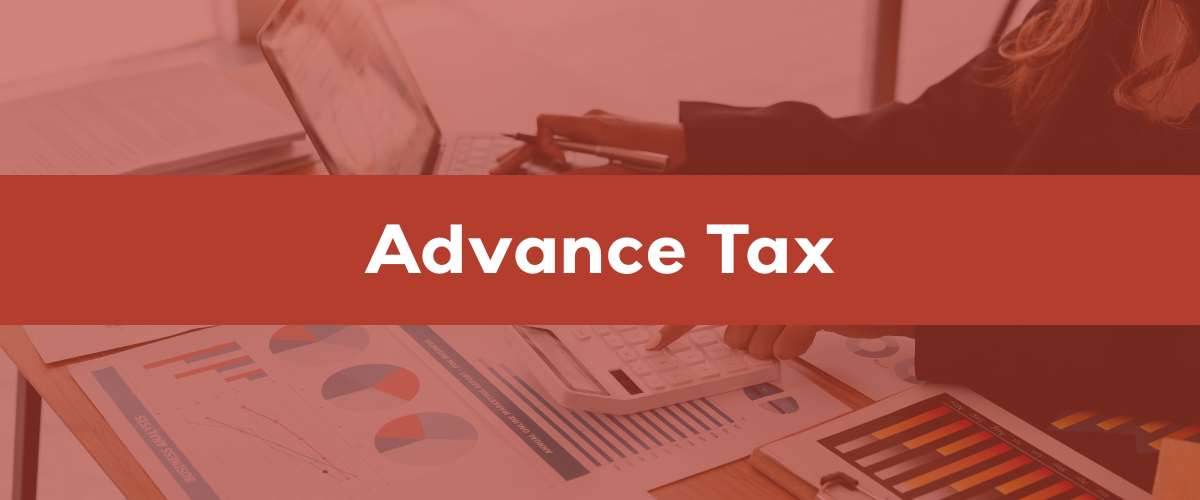Advance Tax is a legal obligation and compulsory for certain tax payers. Non compliance with advance tax rules may even attract penal interest u/s 234 C.
Think of it as “Pay as you earn” – helping you avoid a large tax burden at the end of the year.
WHO SHOULD PAY ADVANCE TAX ?

All taxpayers – whether salaried, freelancers, business owners, or even those who are earning only from rent or other sources like interest etc. – are required to pay advance tax if :
- Their estimated income tax liability for the year is more than Rs. 10000 after deduction of TDS/TCS and MAT credit.
However, senior citizens (aged 60 years or above), who are Indian residents, and do not have any income from business or profession, are exempted from paying advance tax.
Pro Tip: Even if you’re not running a business, check your tax estimate early—advance tax rules still might apply!
HOW TO CALCULATE ADVANCE TAX ?

Advance Tax is calculated exactly the same way as your regular income tax :
- Calculate your estimated Gross Total Income from all sources and heads of income.
- Deduct eligible deductions as per your chosen tax regime.
- Arrive at your estimated net taxable income.
- Now compute your total tax liability as per slab rates and as per special rates applicable to special incomes like Capital Gains etc.
- Subtract TDS/TCS or other credits from your income tax liability
- If the balance is more than Rs. 10000/-, then it shall be your advance tax liability.
Always re-evaluate your income after any major financial event—like a bonus, capital gains, or windfall income.
HOW TO PAY ADVANCE TAX ?
Advance Tax is based on ‘pay as you earn’ concept, so that tax is paid gradually, avoiding a last minute extra burden while filing ITR.
Therefore, a 4 Instalment calendar was introduced by the Income Tax department.
Following is the due date as per the advance tax calendar and the advance tax instalment to be paid at each due date.
| Due Date | Advance Tax Liability |
| June 15th | 15% of the estimated total tax liability |
| September 15th | 45% of the estimated total tax liability (-) less earlier instalments |
| December 15th | 75% of the estimated total tax liability (-) less earlier instalments |
| March 15th | 100% of the estimated total tax liability (-) less earlier instalments |
It’s a good habit to review your estimated income before each instalment.
For Example: Around the first instalment in June, your estimated annual income is Rs. 20 lakhs, so you calculated your income tax and resultant advance tax liability accordingly. But if you receive a special income or bonus of Rs. 10 lakhs in November and now your annual income rises to Rs. 30 lakhs. You need to recalculate your income tax and resultant advance tax liability again.
Therefore, advance tax liability is dynamic in nature and should change as per changes in your income during the year.
Special Note :
Taxpayers who have opted for presumptive taxation scheme for their income from businesses (u/s 44AD) or profession (u/s 44ADA), are allowed to pay their entire advance tax liability in one instalment on or before 15th of March of the financial year.
WHAT IF ADVANCE TAX IS NOT PAID ?

Under Section 234C, if Advance tax is not paid or is short-paid, simple interest at the rate of 1% per month (or part thereof) is charged, on the outstanding advance tax liability. Such interest is charged only till 31st March of the relevant financial year.
Thereafter, if 90% of the total tax liability is not paid through advance tax by 31st March, interest is charged u/s 234B at the rate of 1% per month (or part thereof), on the total outstanding tax liability from 01st April till the date of payment. (assuming ITR is filed on or before the due date).
Avoid interest penalties by paying on time and tracking changes in your income throughout the year.
WHAT IF EXTRA ADVANCE TAX IS PAID ?
Don’t worry! If you end up paying extra advance tax – more than your actual tax liability at the time of filing your ITR – You can claim a refund of the excess tax paid while filing your ITR.
Make sure your bank details are correct in your ITR to get your refund smoothly.
PAYMENT OF ADVANCE TAX
Advance Tax can be paid online through the income tax portal using the ‘e-Pay Tax’ service.
- Log in and go to ‘e-Pay Tax’
- Fill in the basic details
- Then select relevant Assessment Year
- Choose Tax Head : ADVANCE TAX and Minor Head Tax Code : 100
- Enter the Tax Amount and choose your preferred mode of payment.
Online payment is simple, fast, and generates an instant challan receipt for your records.
Final Thoughts
Advance Tax is not just a legal requirement. It is a smart way to plan your taxes and avoid last-minute stress, interest, penalties, and sudden tax burdens.
If you’re unsure, consult a tax professional or CA before each instalment. A little bit of planning can save you from unnecessary interests and penalties.


